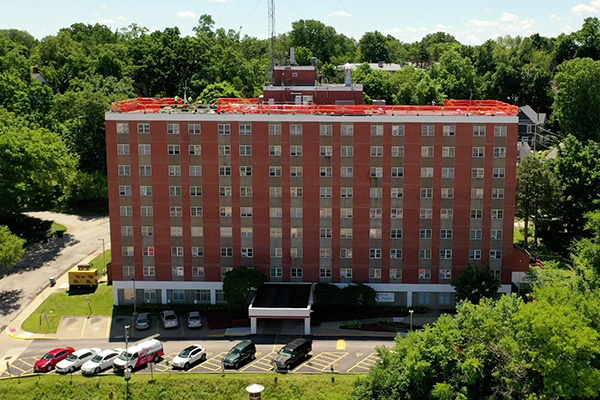Housing Choice Vouchers
The housing choice voucher program is the federal government’s major program for assisting very low-income families, the elderly, and the disabled to afford decent, safe, and sanitary housing in the private market. Since housing assistance is provided on behalf of the family or individual, participants are able to find their own housing, including single-family homes, townhouses and apartments.
How It Works
The participant is free to choose any housing that meets the requirements of the program and is not limited to units located in subsidized housing projects.
Housing choice vouchers are administered locally by public housing agencies (PHAs). The PHAs receive federal funds from the U.S. Department of Housing and Urban Development (HUD) to administer the voucher program.
A family that is issued a housing voucher is responsible for finding a suitable housing unit of the family’s choice where the owner agrees to rent under the program. This unit may include the family’s present residence. Rental units must meet minimum standards of health and safety, as determined by the PHA.
A housing subsidy is paid to the landlord directly by the PHA on behalf of the participating family. The family then pays the difference between the actual rent charged by the landlord and the amount subsidized by the program. Under certain circumstances, if authorized by the PHA, a family may use its voucher to purchase a modest home.
Eligibility
Eligibility for a housing voucher is determined by the PHA based on the total annual gross income and family size and is limited to US citizens and specified categories of non-citizens who have eligible immigration status. In general, the family’s income may not exceed 50% of the median income for the county or metropolitan area in which the family chooses to live. By law, a PHA must provide 75 percent of its voucher to applicants whose incomes do not exceed 30 percent of the area median income. Median income levels are published by HUD and vary by location. The PHA serving your community can provide you with the income limits for your area and family size.
During the application process, the PHA will collect information on family income, assets, and family composition. The PHA will verify this information with other local agencies, your employer and bank, and will use the information to determine program eligibility and the amount of the housing assistance payment.
If the PHA determines that your family is eligible, the PHA will put your name on a waiting list, unless it is able to assist you immediately. Once your name is reached on the waiting list, the PHA will contact you and issue to you a housing voucher.
Process
The housing choice voucher program places the choice of housing in the hands of the individual family. A very low-income family selected by the PHA to participate is encouraged to consider several housing choices to secure the best housing for the family needs. A housing voucher holder is advised of the unit size for which it is eligible based on family size and composition.
The housing unit selected by the family must meet an acceptable level of health and safety before the PHA can approve the unit. When the voucher holder finds a unit that it wishes to occupy and reaches an agreement with the landlord over the lease terms, the PHA must inspect the dwelling and determine that the rent requested is reasonable.
The PHA determines a payment standard that is the amount generally needed to rent a moderately-priced dwelling unit in the local housing market and that is used to calculate the amount of housing assistance a family will receive. However the payment standard does not limit and does not affect the amount of rent a landlord may charge or the family may pay. A family which receives a housing voucher can select a unit with a rent that is below or above the payment standard. The housing voucher family must pay 30% of its monthly adjusted gross income for rent and utilities, and if the unit rent is greater than the payment standard the family is required to pay the additional amount. By law, whenever a family moves to a new unit where the rent exceeds the payment standard, the family may not pay more than 40 percent of its adjusted monthly income for rent.
Continual Assistance
A family’s housing needs change over time with changes in family size, job locations, and for other reasons. The housing choice voucher program is designed to allow families to move without the loss of housing assistance. Moves are permissible as long as the family notifies the PHA ahead of time, terminates its existing lease within the lease provisions, and finds acceptable alternate housing.
Under the voucher program, new voucher-holders may choose a unit anywhere in the United States if the family lived in the jurisdiction of the PHA issuing the voucher when the family applied for assistance. Those new voucher-holders not living in the jurisdiction of the PHA at the time the family applied for housing assistance must initially lease a unit within that jurisdiction for the first twelve months of assistance. A family that wishes to move to another PHA’s jurisdiction must consult with the PHA that currently administers its housing assistance to verify the procedures for moving.
Regulations are found in 24 CFR Part 982
More Info
FAQ
What is Housing Choice Voucher (Section 8) rental assistance?
Housing Choice Voucher (Section 8) rental assistance is a government subsidy that allows eligible families to rent in the private market and pay approximately 30% to 40% of their income toward rent. The SNRHA pays the remainder of the rent directly to the landlord.
Can anyone apply for Housing Choice Voucher (Section 8) rental assistance?
Yes, however, please check the MHA website regarding HCV, Public Housing, and Affordable waitlist statuses and applications. For more information about these programs, please email frontdesk@molinehousing.com.
Can I apply for both housing choice voucher (Section 8) and the family public housing program?
Yes, if both wait lists are open.
How do I apply for housing?
Please visit our HCV and Public Housing webpages on our website.
How do I find out the status of my application or my place on the waiting list?
You may email frontdesk@molinehousing.com.
How long does it take to receive a voucher from the MHA?
The amount of time it takes to receive a housing choice voucher depends on funding availability based on either new funding or turnover of vouchers. Once funding is available, the next applicants on the Housing Choice Voucher (Section 8) wait list are pulled by date/time of application. Prior to a voucher being issued, the client and all family members must be certified as eligible. Please note, if you owe a Housing Authority a debt, you cannot be housed. Due to high demands for rental assistance under this program, it’s hard to predict how long the wait will be once you are on the waitlist.
What should I do if my address changes while I am on the waiting list?
You should notify MHA of all changes of address in writing by email at frontdesk@molinehousing.com or by mail at 4141 11 AVE A Moline, IL 61265.
What if someone in my family does not have a Social Security number/card, birth certificate or other required documentation?
It is required that Social Security cards and birth certificates are submitted for everyone in your household if they have a Social Security number. If any family member does not have a Social Security number or birth certificate, they must submit a signed certification that they have no number. All household members 18 and older must provide a photo ID.
Does the MHA check an applicant’s past history in order to determine if he/she is eligible for housing?
Yes. MHA checks an applicant’s past rental history, when he/she applies for our public housing, voucher program and/or affordable housing program. We also conduct a criminal records check to help determine if an applicant is eligible for housing, this may include fingerprints. If an applicant is determined not eligible for housing, or a participant is terminated or resident is evicted, he/she has the right to file an appeal with the MHA’s hearing office. For more information on filing an appeal, you may reference your denial letter.
How long is a housing choice voucher good for?
Once a voucher is issued, a participant has 60 days to find a suitable unit before the voucher expires. However, under certain situations, MHA may provide up to 2 extensions of another 30 days. The request for the extension must be received PRIOR to the voucher expiration date. No extension can be provided after the voucher expires and you will NOT have a right to a hearing.
Can I use housing choice voucher (HCV) to move outside of Moline?
Yes. A housing choice voucher may be used in any area in the United States that has a Section 8 Housing Choice Voucher Program. Click here for our portability page (insert link here)
How do I find housing?
You may look at Affordablehousing.com and socialserve.com. In addition, a list of landlords will be provided at voucher issuance.
Where can I look for housing with a MHA Voucher?
Moline, IL is the jurisdiction of Moline Housing Authority.
Who is responsible for paying the Security Deposit?
The Housing Choice Voucher participant is responsible for the Security Deposit.
What will I be expected to pay for rent?
Housing Choice Voucher (Section 8) recipients are expected to pay 30% to 40% of their adjusted total household income for rent. All income changes must be reported in writing within 10 days of any change.
Does the MHA pay my rental assistance to me or my landlord?
The MHA pays your rental assistance to the landlord on the first of each month. You must also pay your share of the rent each month. Failure to do so can lead to termination of your rental assistance.
What happens if my income or family composition changes after I begin receiving rental assistance?
Whenever your income changes or you have a change in family composition (persons moving in or out of your household, including a new spouse) you are required to report the change to MHA in writing within 10 days. The MHA will determine if and when a change in rent is required. You are not allowed to move anyone into your unit without prior written approval except a child that is yours by birth, adoption or foster care. This includes a spouse or adult children. Please remember to notify your caseworker immediately of a request to add a family member and your landlord/owner, as both must approve the addition.
How often is my income reviewed?
Every household that receives housing assistance must undergo an annual recertification. You will receive a notice regarding this approximately 90-120 days prior to your scheduled recertification date. We will also send you forms that you are required to complete and return in order to verify your income and continued eligibility for the program. When you receive this request for information, you must respond by the due dates stated in the letter and have the documents completed. You must have everyone over 18 sign the forms. All proof of income, assets, expenses, etc., must be returned with the packet. Failure to return your packet may lead to termination of your rental assistance.
MHA may review your income more frequently under certain circumstances.
What happens if my unit needs repairs?
You should notify your landlord immediately if your unit needs repair. If violations are found at the time of an initial or annual inspection conducted by the MHA, a letter will be sent to your landlord with a copy to you. The violations must be corrected within 30 days for non-emergencies and 24 hours for emergencies. Our office will conduct a re-inspection to verify that the items have been corrected. If you contact your landlord/owner and they do not respond within a reasonable timeframe, please contact your MHA caseworker. Please ensure that you have called the manager/owner prior to contacting our office for any repairs. Utilities must be kept on in the unit at all times.
How long can I remain in the Housing Choice Vouchers (Section 8) program?
Current program rules allow you to continue to receive housing assistance as long as you are income-eligible and as long as you fulfill the tenant obligations established by U.S. Department of Housing and Urban Development (HUD) for the program. You will lose your assistance when your income rises to the point that your portion of the rent matches or exceeds the full amount of the rent for six months or if you are terminated from the program for violating the rules, including being evicted for cause.
What if I want to move at the end of my lease?
- You must be in good standing with your landlord.
- Complete and submit your intent to vacate with your landlord and MHA
What if my landlord/owner wants me to move?
- Your landlord must submit to the participant a 6-day notice of non-renewal which states the date they need the participant to vacate.
- The participant needs to submit that letter to MHA





